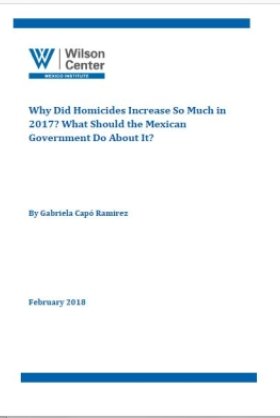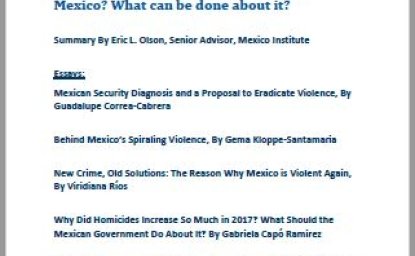Why Did Homicides Increase So Much in 2017? What Should the Mexican Government Do About It?


The wave of violence and insecurity that Mexican citizens experienced and suffered in 2017, and the deaths that it has produced cannot be understood in a vacuum. This is not a phenomenon that occurs inexplicably and from one day to the next. The fact that over 25,000 people lost their lives in one year is the by-product of a series of events and policies that began ten years ago with the so called “war” against organized crime and drug cartels headed by President Felipe Calderón.
For Mexico, 2017 marks the year in which the number of homicides reached a never before seen peak. With over 25,000 intentional murders last year, Mexico experienced its highest homicide rate in twenty years, since official statistics were first reported in 1997.
To understand how the country reached and surpassed the homicide rate that the World Health Organization considers an epidemic (more than 10 homicides for a population of 100,000 people), it is necessary to undertake a multifactorial analysis. Within some of the elements to look at are: how organized crime and cartels’ dynamics developed post 2006; how this was effected either by the involvement, protection, and in many cases coercion of government officials; the role of intrafamily violence; the increase in weapon trafficking to Mexico; and the implementation of the government’s crime and violence prevention strategy.
The list of factors driving the continuous increase in homicides in Mexico is vast, but allow me to focus on the one topic, which in my opinion, lies at the root of the problem and which constitutes the main enabler. Impunity, or the lack of judicial accountability, has permeated Mexico for decades and provides fertile ground where criminal behaviour can flourish. It is not a coincidence that, according to the 2017 Impunity Global Index developed by Universidad de las Americas Puebla, Mexico holds the first place in the American continent, and the fourth place worldwide for impunity. Widespread impunity basically represents a blank check and a perverse incentive which encourages criminals to engage in illicit activities (that in many cases result in homicides).
In Mexico, factors like corruption, deficiencies in investigative capacity, and the lack of continuity in government initiatives related to security and justice, feed and strengthen impunity levels. The possibility of being detained is too low to represent a risk or a deterrent, so for anyone involved in criminal activities the cost – benefit analysis clearly encourages this line of action.
If authorities at the municipal, state, and federal levels in Mexico really want to attack Mexico´s homicide epidemic, they need to implement a series of actions that tackle the country’s impunity problem and that, step by step, reverse the current cycle. Also, any strategy or policy implemented will be incomplete if it does not consider prevention policies as part of a holistic security and justice strategy.
In recent years Mexico has implemented significant reforms which aim to build a more efficient and transparent criminal justice system, to further protect human rights; to grant victims access to justice and reparation; to have solid systems for the execution of sentences, etc… Nevertheless, and despite how critical these reforms are, they have not reached their optimal level of operation and impact; therefore, indirectly contributing to the impunity cycle.
Presidential and local elections taking place in Mexico in 2018 represent a golden opportunity for candidates to address the homicide epidemic and to place the fight against impunity at the core of their political platforms. Only history will tell if there is a person with the vision and strength to fully commit to this cause, or if Mexico will close 2018 with, yet another, new record in the number of homicides.
Author

Mexico Institute
The Mexico Institute seeks to improve understanding, communication, and cooperation between Mexico and the United States by promoting original research, encouraging public discussion, and proposing policy options for enhancing the bilateral relationship. A binational Advisory Board, chaired by Luis Téllez and Earl Anthony Wayne, oversees the work of the Mexico Institute. Read more




